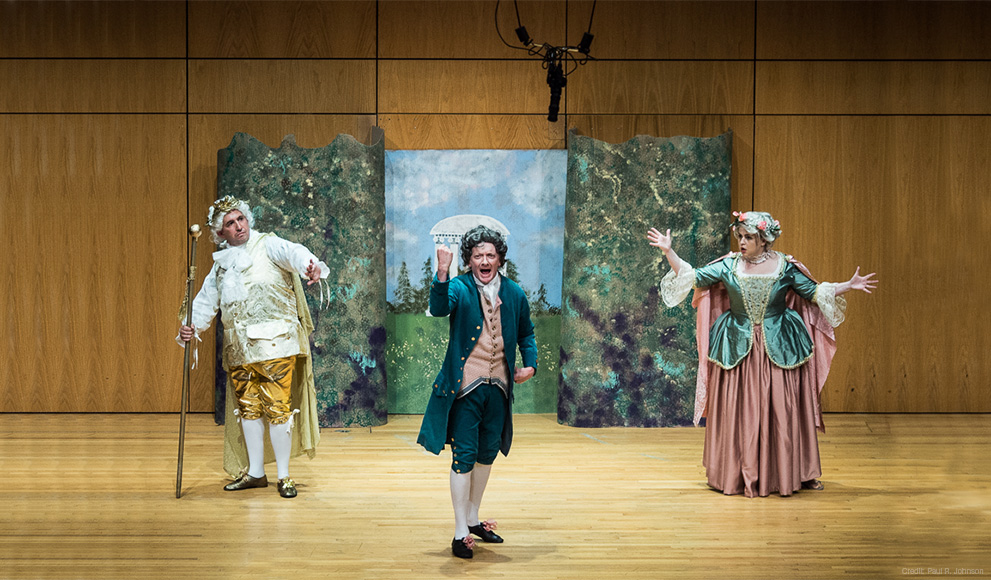Creative Pursuits Outside Of The Classroom Provide Faculty With Personal and Professional Enrichment

Flip through Wellesley's online faculty profiles and you’ll find poets, artists, actors, novelists, musicians, and more. For some, these things are reflected in their academic appointment. For others, they represent a personal interest or passion.
"I chose the life of an astronomer over that of an opera singer, but I still love music and the allied arts," wrote Dick French, Louise Sherwood McDowell and Sarah Frances Whiting Professor of Astrophysics and professor of astronomy, in his profile. "I enjoy mountaineering, paddling, bicycling, and photographing my travels around the world. I love to cook, to study languages, and to learn about the obscure origins of words."
Faculty members are engaged in a diversity of things outside the classroom, often outside of what's usually thought of as their discipline. For many, these project and interests provide deep personal and professional enrichment.
Larry Rosenwald, Anne Pierce Rogers Professor of American Literature and professor of English (pictured), has written and performed some 50 pieces of early theater music in the past 27 years, including baroque operas, masques, ballets, and pageants.
Rosenwald said he was first asked to write and perform a verse script in 1988. "I hadn't previously thought of myself as an actor, and I certainly hadn't previously thought of myself as a poet, [or] a writer of verse," Rosenwald said. Over the years, he cultivated his craft by showing his scripts to poets, including (and especially, he said) his friend and former colleague David Ferry, Sophie Chantal Hart Professor Emeritus of English.
"It makes me happy...extremely happy in fact," Rosenwald said. "But it's also had a big effect on my teaching, both of poetry and of theater, because I have a much more inward knowledge of these modes of art than I'd ever have predicted I would."
For Beth DeSombre, Camilla Chandler Frost Professor of Environmental Studies, it’s music.
"Music, and folk music in particular, has been a part of my life since I was little," she said. DeSombre grew up listening to folk music with her parents and has been an on-and-off performer and songwriter for most of her life. She taught herself to play guitar when she was in the 4th grade, then, later, other instruments, but said she is a songwriter first and foremost.
"When I'm in the middle of writing a song, I tune out everything in the rest of the world and really focus. In that way, even though it takes a lot of time and energy, it's restorative in terms of clearing out my mind for the things I do in the rest of my life," she said, adding, "it is so different from my academic work that it's a nice balance."
Despite her music and academic interests seeming dissimilar, she has found ways to combine them. "I have a song, for instance, that touches on the environmental problems facing shrimp fishers in the Gulf of Mexico," she said. "The kind of phenomena I study as a social scientist make their way into the stories I tell in my songs."
She also recently participated in a year-long focus on sustainability at a local high school where she served as opening academic speaker at the start of the year, then later conducted workshops both on sustainability and on songwriting (focusing on environmental themes), and closed the year with a concert performance.
"Teaching translates across topics—when I teach people how to play an instrument, or teach songwriting workshops...it uses the same skills as when I’m teaching in an academic classroom," she said. "The influence works both ways, though. I think the kind of careful attention to words and phrasing in songwriting has influenced my academic writing—I pay more attention to how I express things."
As DeSombre's experience suggests, creative endeavors that are more closely related to an academic focus, are enriching, too. James Oles, senior lecturer in the art department, is a specialist in Latin American art, focusing on modern Mexican art and architecture. One of his shows recently landed on a list by Beaux-Arts magazine (France) of "the 50 upcoming shows that make them rejoice." The show, Lola Alvarez Bravo, consists of 75 prints by the eponymous Mexican photographer.
"I met Lola Alvarez Bravo in 1990 when I was interviewing people who had been around in Mexico in the 1930s and 1940s, and even 1920s, for my first book/exhibition project, called South of the Border: Mexico in the American Imagination, which opened at Yale Art Gallery in 1993, when I was a grad student," Oles said. "One of the reasons I only teach part-time at Wellesley is that much of my life is devoted to curating and organising exhibitions, not just for Davis—where I'm an adjunct curator—but for a variety of institutions, mainly in Mexico City, where I am based most of the year," he said.
